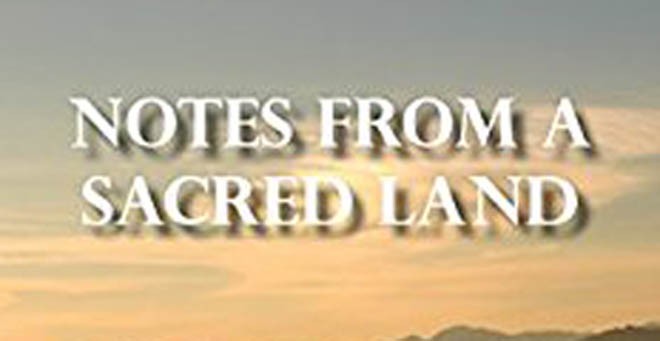
A British charity worker’s personal impressions of Pakistan and its people penned as a collection of narratives

Matthew Vaughan is a British charity worker based in Islamabad. He moved to Pakistan in 2011 and for the last six years he has been enjoying everything about Pakistan: its chaotic traffic, bustling bazaars, chai dhabas, taxi rides, the local cuisine and so on. He has no regrets about moving himself and his family to Pakistan.
When he first arrived, he was nervous - like most foreigners are - about the country and its people. But once he mingled with the people, travelled the length and breadth of the country, experienced Pakistani hospitality and the jovial nature of the people who treated him with love and respect, his perception altered.
He decided to scribble his stray thoughts about the country, its people and various places he visited during his six-year stay, as a collection of narratives that have now been edited together. That was how Notes From A Sacred Land was born. He doesn’t regard his book as a scholarly work on Pakistan but rather as "an account of the side of Pakistan less commonly seen, a handful of personal impressions of the country and its people, characterised by a great deal of kindness, hospitality and hope". This doesn’t mean he denies or ignores the multifarious problems the Pakistani society is facing. Not at all. But what he believes is that Pakistani people are resilient and bound to overcome the existential challenges they face.
The book comprises 20 short episodes of adventures within Pakistan. He loves frequenting bazaars, eateries, tea stalls, bookshops and historical places. His tales hold conversations with fruit sellers, tea-stall owners, taxi drivers and others with whom he hobnobs. Unlike other foreigners, he doesn’t feel nervous visiting these places and thus his narrative is humane and natural.
In fact, his portrayal of an average bazaar in Pakistan is spot on with its deft re-creation of the ambience. His writing is strong: "Walking through Pakistani streets is a skill acquired through painful experiences. Pavements are broken, gutters are usually clogged with rubbish, or flooded, and a wild medley of vehicles plies the streets at high speed and in all conceivable directions. Losing concentration even for a second can result in a collision".
He shares how once he was almost devastated by a taxi galloping down the wrong side of the road. Luckily it screeched to a halt just few inches away from his body and the "driver put a finger to his head - a way of politely enquiring about my mental health". But despite such ugly episodes, he can’t help strolling along our dingy, overcrowded lanes because it’s alluring for him.
For enjoying piping hot tea and delicious daal, he combs the cluttered alleys of old Rawalpindi. But there is more to the old city than cuisine. The rotting historical landmarks of Sikhs and Hindus in the timeworn lanes of Rawalpindi haunt him. He walks thorough Bhabra Bazaar, Moti Bazaar, Kohati Bazaar and is stupefied by Rai Bahadur Sujan Singh’s majestic haveli and the decrepit Hindu Kalyan Das temple located near Kohati Bazaar. The cultural and historical diversity of Rawalpindi amazes him.
A book lover and author in his own right, there was no chance of him missing literary gatherings taking place in the country. He writes a wonderful chapter on his experiences at the Lahore Literary Festival. The well-attended literary sessions thrill him and he gives all credit to the attendees who come despite the dangers. He chides western observers and analysts who, in his estimation, go the extra mile to portray Pakistan too harshly. "Pakistan is a country burdened with a cruelly undeserved reputation. Its critics are all too keen to subscribe to the notion that it’s a country composed largely of dust, rock and men with beards. This notion is propounded by armchair journalists who rarely concern themselves with trivialities such as actually bothering to visit the country or, when they do, venture too far from the leafy avenues and the illicit bars of Islamabad". He scorns his western counterparts who didn’t take the risk of visiting the actual Pakistan.
The charity worker, and author, visits Murree, Kaghan, Faisalabad and other places and thus tries to present a real image of Pakistan. Pakistan, for Matthew Vaughan, is sacred and one has to read the book to know the reasons.